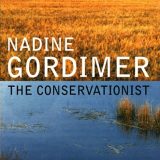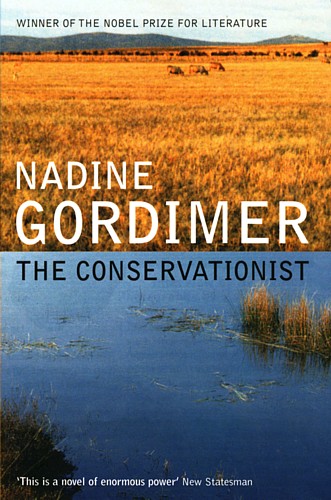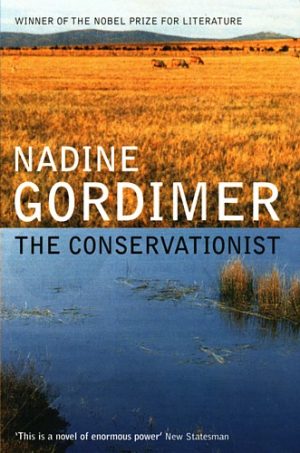Conservationist – Nadine Gordimer – 1974
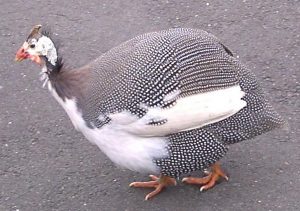
Posted by Ladypurple on 29/3/2006, 16:53:02
I like her earlier work. Did I tell you that I met her once at her house in Jo-burg? What a privilege! She was so gracious and kind.
Friederike
~
Posted by Lale on 29/3/2006, 18:49:38
: Did I tell you that I met her once at her house in
: Jo-burg? What a privilege! She was so gracious and kind.
No, you didn’t tell us!!! What was she like? When was this? Wow. Indeed, what a priviledge.
Lale
~
Posted by Ladypurple on 1/4/2006, 13:49:11
Yes, it was quite extraordinary to meet Nadine. I was staying with two journalists in Jo-burg for a few days to talk to people about censorship. I was working in London for a Right to Information organization (Arricle 19) then. This must have been in 1987 or so, very much Apartheid days. I met several black journalists and authors. And the journalists wondered whether I was interested in meeting with Nadine. And she agreed. So we spend a few hours in her garden, sipping a G&T (gin and tonic) and chatted about S.A., the political and cultural problems and the people she supported. Through her I met a few more articst etc. It was very memorable, of course. She was very down to earth and modest in a way. Her lovely husband drove me back to my friends place. He was (probably is) very interesting too. Very quiet and gentle. Fom Jo-burg I went to Lesotho for a conference on human rights…
Cheers
Friederike
~
Posted by Steven on 30/3/2006, 16:03:08
I read the first two chapters on the way to work this morning, and I’m eager to read more. So far it’s like a trip back in time to the farm I lived on as a child. The landscape was very similar. We even had guinea fowl. (No corpses, though!) Racial attitudes and institutions were similar to South Africa’s at that time as well.
The use of present tense is very interesting. It gives you a sense of living the events of the book, and that the outcome hasn’t been determined yet.
~
Posted by Lale on 30/3/2006, 17:16:37
: The landscape was very similar. We even had guinea
: fowl. (No corpses, though!) Racial attitudes and
: institutions were similar to South Africa’s at that time as well.
That is so interesting. For me, it is the opposite. I have never lived on a farm, never really visited one either. I see it in books and movies. I am really into this book, I can see Jacobus, his outfit, his hands as he rolls the cigarettes…
By the way, are you guys tempted to say Conversationist instead of Conservationist? The former is always at the tip of my tongue or at the tip of my fingers whenever I want to mention this book to someone. I have to make an effort to bring “conserve” into my mind to be able to get the right title out.
Lale
~
Posted by Lale on 30/3/2006, 17:23:24
: We even had guinea fowl.
And I have never seen a guinea fowl in my life.
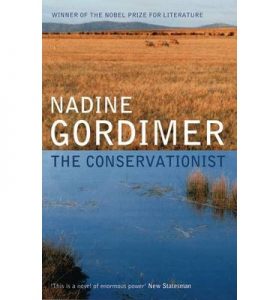
Posted by Steven on 30/3/2006, 23:58:15
Yes, that’s a guinea fowl (or guinea hen as we usually called them). My aunt had a flock of them on her farm which was near ours. She raised them only as pets – we didn’t eat them or their eggs. Despite their plump bodies they run very fast. Like chickens, they fly very rarely, if at all. They also make a lot of noise when disturbed, so some farmers keep them as a kind of feathered alarm system. I hadn’t seen any for years until I saw a flock on a farm just last fall.
~
Posted by Lale on 3/4/2006, 21:13:45
Friederike, maybe you know this from your South Africa experience; and Steven, maybe you have understood what this meant in the book: What exactly is a “location”?
I understand that it means “settlement” but I would like to know/understand a little better beyond a vague concept. How does it function, how is it managed, or things like that. It has its own hospital but the children from the location go to school at the farm …
Anyone who can shed some light on this?
Lale
~
Posted by Lale on 4/4/2006, 8:30:32
So, there is the farm, the location and the shanty town. Then there is the town.
Anyone?
Lale
~
Posted by Steven on 4/4/2006, 15:11:23
This is from an article on South African history on the SA government’s web site:
“Africans could be denied basic rights if the fiction could be maintained that they did not belong in ‘White South Africa’ but to ‘tribal societies’ from which they came to service the ‘White man’s needs’. Where Black families secured a toehold in the urban areas, local authorities confined them to segregated ‘locations’. This set of assumptions and policies informed the development of segregationist ideology and, later (from 1948), Apartheid.”
Here is the full article: http://www.info.gov.za/aboutsa/history.htm
I would assume that the ‘shanty town’ describes the settlement with the ‘location’ where the non-Whites lived.
Steven
~
Posted by Ladypurple on 4/4/2006, 17:29:28
A shanty town is an urban slum so to say. Under apartheid it meant blacks’ districts. The most famous was Soweto. It was just basic shacks and very basic services where people were cramped together…
I have to check on location
Cheers
Friederike
~
Posted by Steven on 4/4/2006, 15:31:24
Mealies and Pap
I had to look this up as well…
Mealies is the local term for corn (maize). It’s the principal crop in South Africa.
Pap is a porridge made from ground corn. It is similar to grits and polenta.
~
Conservationist – Vocabulary
Posted by Lale on 11/4/2006, 9:55:11
vlei – I found some images on the net, but they don’t fit the description in my dictionary:
1. South Africa: A shallow pool of water; a iece of low-lying ground covered with water during the rainy season.
2. Local, US: A swamp.
veld – also veldt, velt: In S. A. the unenclosed country, or open pasture-land
piccanin – my dictionary has only piccaninny and pickaninny: A little one, a child: applied esp. to the children of negroes, or of South Arican or Australian natives.
~
Posted by Andrew S on 13/4/2006, 16:02:48
Springbok is a well-known Afrikaans word for a sort of gazelle. My Brother-in-law and his sisters grew up in Jo’burg, and they emigrated here in the early eighties so he wouldn’t be drafted into the army. Their loss is my sister’s gain. Very often I can communicate with him using Dutch words – especially if we don’t want my sister to know.
He’s been here long enough that his accent is minimal, but his two sisters, 12 & 14 years older than he have very pronounced accents. So South Africans are always surprised when I recognize where they’re from. Mostly they say Americans figure they’re some kind of rogue Australian.
Evidently there’s a largish population of South African Jewish Emigres on the San Francisco Peninsula. They completely miss the irony of me calling them a ‘Tribe.’ But when I mention about dropping in to see them in their “Bantustan’, they grimace. Anyone who wants to see a tatoo of a Springbok, email me offline!!!
Andre

Posted by Ladypurple on 25/4/2006, 15:29:08
First apologies for not getting into full swing with the Conservationist yet!
I wonder whether you have read the excellent article on Nadine Gordimer and her work on the Nobel web site. If not, I recommend it highly.
http://nobelprize.org/literature/articles/wastberg/index.html
Friederike
~
Posted by Ladypurple on 1/5/2006, 6:48:01
Hi all,
I finally finished the Conservationist! Here are some questions for us to discuss as well as some reactions from me to the book.
Why the title?
What do you make of the prose quotations from Rev. Henry Callaway? Does it add to the story? Why are they there?
What about the content of the book? What is your reaction? What do you make of Mehring, of Jacobus, the India shop keeper family?
What about the language style that Gordimer uses? Is the book dated or still relevant?
By the way, if you are interested in Amatonga, the Creation Story and other writings about African religion by Callaway, here is a link to his work: http://www.sacred-texts.com/afr/rsa/index.htm
More questions?
~
Posted by Ladypurple on 1/5/2006, 7:07:10
Here are some of my reactions to the book, keeping the questions I posed in my previous note in mind.
The title? If I hadn’t read about it, I don’t think I could have come up with a meaning of the title for the book.
The prose quotes from Callaway – I am not sure what it adds to the story except for creating some atmosphere for the Africans’ life on the location. Introducuing Zulu mystery in such a way did not add much for me. Unless the reader knows more about the context – which probably many readers at the time of the publication in South Africa did.
Creating a mystique around the African protagonists in this way could be interpreted in different ways. Giving Nadine Gordimer’s background and life, one has to assume that she wanted to show the spiritual context in which the Africans in the story live. Otherwise it could be interpreted in a less positive way.
My first reaction to the story is : intriguing. It was not an easy read, I had to go very slow and reread passages. Even then, I felt that I was missing meanings as so many things, events and more were only hinted at. Exploring the lives of Mehring and the African community was like doing a jigzaw puzzle where you don’t know the picture that should be the end result.
The constant switch from internal monologue, internal dialogue and narrator’s descriptions was at times confusing, I thought. The tensions between the ethnic groups came out pretty clearly, Mehring and Jacobus, the Indians vs the black Africans, etc. Mehring’s character is evidently at the centre of the story – not a very pleasant personality, but he has his moments.
I found fascinating the description of landscapes, environment and seasons. And, how Mehring gets drawn more and more into that landscape. It distances him from his partying friends, lovers and otheers. But he gains new insights of himself. I was wondering how the book would end, and in a way it was a logical conclusion.
More later
Friederike
~
Posted by Ladypurple on 1/5/2006, 7:18:09
Part 2 of my reactions
I had to remind myself constantly that the book was written in 1971/2. At that time, the handling of any aspect of Apartheid was probably complicated by the way in which things could be expressed openly. Gordimer’s style must have been quite a novelty at the time, in particular for South Africa (or anywhere else in Africa). I am in two minds about it. A bit more structure may have aided the flow of the story. On the other hand, the story needed the inner dialogues which, by natrure, jump around from past to present to past.
Jacobus and his family and neighbours on the location live their lives whether Mehring is around or not. At the same time, Mehring represents some authority and order that the community accepts and submit to. The descriptions of their lives are realistic and down to earth.
The most expressive language is reserved for the landscape descriptions – not surprising. The land is beautiful, fragile and always changing.
Over to you
Friederike
~
Posted by Steven on 1/5/2006, 11:44:48
I thought The Conservationist was a superb book – one of the best I’ve read from the post-1950 period. As I’ve mentioned earlier, I grew up in a rural environment in a racially segregated society, so there’s much in the book to which I can personally relate.
: Why the title?
I assume it refers to Mehring’s clinging to a mode of life that depended on a social structure that was obviously doomed to extinction.
: What do you make of the prose quotations from Rev.
: Henry Callaway? Does it add to the story? Why are they there?
Not knowing the background to them, I can only say that they set a mood – that this is an African story, and the European presence is just a momentary phenomenon in the grand sweep of things.
: What about the content of the book? What is your
: reaction? What do you make of Mehring, of Jacobus, the
: India shop keeper family?
Each of the three accepts his place in the system and works to make the best of it. They have no hatred of the other races, nor do they have any ideology that demands change. They can’t understand why the younger generation wants to upset things, because they each – even Jacobus – think they have more to lose than to gain.
Apart from this similarity, Mehring is interesting because he is a solitary person, but very self-indulgent. He’s rich and evidently hard-working, but his first priority is physical pleasure – a rather unusual combination.
: What about the language style that Gordimer uses? Is
: the book dated or still relevant?
The switch back and forth between third-person narrative and stream-of-consciousness took some adjustment, but wasn’t difficult with careful reading. The style had a misty, dream-like quality that I found appealing.
: More questions?
What did you think of Mehring’s fondling the girl on the plane, and why did Gordimer describe it at such length?
My first thought was that it was to leave no doubt that Mehring was a reprehensible character. But 30 years ago, in the more sexually adventurous 70s, his actions wouldn’t have been considered as monstrous as today. So I’m thinking it was to display his emotional hollowness. Overall, her portayal of Mehring was rather sympathetic.
Speaking of hollowness, the sparsely furnished house, nothing but a bed and a liquor cabinet, was certainly symbolic of Mehring’s life. No meaning, just the pursuit of pleasure.
There were many other symbolic elements in the novel:
The fire, symbol of social revolution, alarms Mehring but, in the end, is good for the crops. It only destroys some fences (barriers).
His son going barefoot is closer to the land than Mehring can ever be.
And, of course, the nameless body buried under the picnic ground – a faceless class of people buried at the bottom of society while the ruling class takes its idle pleasures.
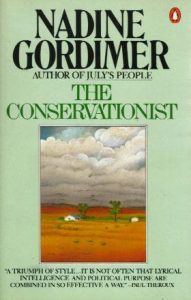
Posted by Lale on 3/5/2006, 10:01:16
: What did you think of Mehring’s fondling the girl on
: the plane, and why did Gordimer describe it at such length?
And that he considered a sexual relationship with his friends’ 16-year-old daughter who had been his son’s playmate?
All the while he certainly had some kind of feelings for the woman (the mistress, or the girlfriend). Even though he was very critical of her too.
It was amazing to me how Mehring saw right through everyone. When people are going through the motions of saying one thing and meaning another thing (or expecting something from him), he sees right through them, the more they try to be obscure the more they become transparent to Mehring.
: My first thought was that it was to leave no doubt
: that Mehring was a reprehensible character.
.
.
.
: Overall, her portayal of Mehring was rather sympathetic.
I switched back and forth between these two thoughts as well. Is he being represented as a reprehensible character or are we expected to think of him as rather nice?
In the end you can’t help but root for him.
In the episode with the hitchhiker girl, you don’t wish Mehring any harm, you want to tell him to get the hell out of there.
Certainly there were worse characters in the book. Mehring’s wife for instance.
: Speaking of hollowness, the sparsely furnished house,
: nothing but a bed and a liquor cabinet, was certainly
: symbolic of Mehring’s life.
This puzzled me. He wanted the land to look its best but he didn’t care about the farmhouse or the outhouse that was used as a junk depot.
And then one day he didn’t mind acting like a cow (some symbolism wrt civilization, maybe) and doing his toilet out in the open. What was that all about?
Now, the end of the book… The picnic with the girl whom took in his car… Did he imagine all of that? Or at least part of it? Or did he manage a narrow escape?
When I read “Witbooi offered to make a coffin.”, I did think it was Mehring who died.
What will happen to the farm? Clearly Mehring lost interest. Or did he? How will he continue, what will he do now? Did he learn a lesson?
Lale
~
Posted by Ladypurple on 3/5/2006, 14:56:59
Interesting to read your take on the book. I was not that enthusiastic about it – maybe because I didn’t have a lot of time and the slow going, even for me, was at times irritating.
I agree with your assessments though. I think Gordimer painted Mehring in both a sympathetic and a negative light. While he doesn’t really care about Jacobus, he brings him supplies and treats. They can at least talk to each other. Mehring relies on Jacobus, probably more than others in his situation would do, such as the de Beers.
I found that Mehring also develops as a character who, initially buys the farm out of a whim, but he grows to relate to the landscape and almost feels the need to get away from the city to be on the farm. He reflects more on the importance of the land – for him and in general.
The part with the girl on the plane – yes, surprising that Gordimer spent so much time on the description. I am not sure that the 70s had something to do with it. I am not sure what she wanted to show here. Probably that Mehring didn’t care to use an opportunity if the whim takes him. He probably would have made a pass at the daughter after they meet in the cafe if the oportunity had presented itself.
I thought that the fire was an unfortunate outcome of the burning of fields that is regularly started as part of the local land management. It just was not as controlled as it should have been.
Friederike
~
Posted by Ladypurple on 10/5/2006, 7:26:05
Hi all,
It seems we got sidetracked from The Conservationist. Maybe, we want to have some conculding comments that can wrap up our views of the novel?
I have not written a review for amazon yet – I am still considering whether I will.
In any event, I am torn between giving it 5 stars or 4. The fact that it did not grab me as much as it did Steven and Lale has more to do with my own frame of mind at this point than the novel. Gordimer’s approach to describe the life of a white privileged South African and her style to reflect his inner musings against the backdrop of life among the black South Africans and in particular against the landscape must have been quite an innovation and challenge for the audience at the time.
What are your round up comments?
Friederike
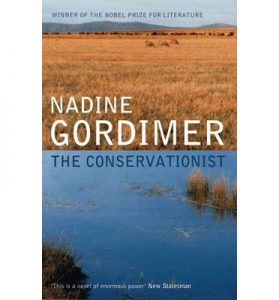
Posted by Lale on 10/5/2006, 9:57:25
: in any event, I am torn between giving it 5 stars or 4.
Me too.
In general, I loved it. But some of the unnatural sexual inclinations of Mehring annoyed me (and, I believe, took away from the story somewhat) and prevents me from recommending this book to everyone. And when I cannot, without discrimination, recommend the book to just anyone, I usually chop off half a star.
I don’t like it when authors include unnecessary episodes just to show that they are liberal enough to write about sick thoughts when the story line doesn’t have a need for it.
It maybe argued that we were provided with the episode on the airplane and the close call with the friend’s teenage daughter because they were all parts of who Mehring was and this deficiency in him played a role in his undoing. I could be convinced.
In any case, I thought it was a brilliant book and I appreciated the exposure to a country and a piece of history that was unknown to me.
Lale
~
Posted by Ladypurple on 10/5/2006, 16:50:47
Hi Lale,
I agree with you that some of the events were not necessary, but as you said, it makes Mehring who he is. Also, it confirms the self-centredness of him who can only see the world as it suits him.
What do you make of the ending?
Friederike
~
Posted by Lale on 10/5/2006, 21:02:32
: What do you make of the ending?
The way I understood it, he did go to the woods with the hitchhiker girl and there he completely lost it, became delusional and he started to imagine other men trying trap him. I think he stood up and started to speak to invisible people while the girl lying on the ground was looking on, shocked.
After the experience (which he must have taken as a close escape even if he understood that he was imagining it (because his imagination showed him how dangerously he was acting)), he seems to have lost interest in the farm.
I am not sure if I “got” the ending right. What did you think?
Lale
~
Posted by Steven on 21/5/2006, 11:18:19
I’m back. We had a wonderful trip to France, visiting Normandy and the Loire Valley. I’ll post a link to our vacation photos once I get them uploaded. As soon as I get over jet lag, I’ll start reading Saturday.
Final thoughts on Conservationist:
I thought it was a great book, deserving of more attention than it seems to have gotten. Definitely 5 stars. I found it comparable to Joyce and Faulkner – moreso the latter because of common themes – but much easier to read. It was rich in metaphor and symbol. It had a strong social message without being preachy.
By presenting Mehring in a generally sympathetic manner, Gordimer showed that apartheid was a system that made victims of everyone involved. She also juxtaposed the three races to show that acquiescence to an unfair system is something that occurs at all levels of society, not just at the top.
If we can read the episodes of the fire, the flood and the reburial of the unknown man as symbolic predictions of the future, then Gordimer seems to have been very accurate in her assessment. It’s easy to forget that she was writing almost two decades before the end of apartheid.
The emphasis on Mehring’s sexual encounters with younger women is a bit difficult to understand. I don’t think the idea was to make him a monster. It may have been to show that a person or race that subjugates another is incapable of forming healthy relationships with its peers, and is inevitably exploitative. Mehring’s excessive drinking and his inability to make a home out of the farm house are similar indicators.
However, the sex episodes may also have been a message about the nature of social taboos in general. The way we feel about Mehring’s lovemaking to underage women is similar to the feeling of many white South Africans at the time about social intercourse with other races. In the episode with the hitchhiker, it isn’t her age that concerns the authorities, but her race. We are never free from social prejudices – the key is to know which are just and which aren’t.
If Conservationist were just about South Africa and apartheid, it would be a good book. What makes it a great novel is the way one can easily relate the story to other places and times, including the current debates over immigrant rights in the U.S. and Europe.
Steven
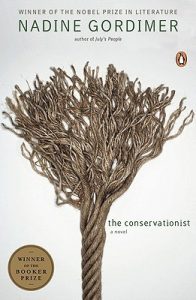
Posted by Steven on 12/6/2006, 22:09:45
Here is a review of the novel that I have just posted to Amazon:
South Africa’s “Sound and Fury”
“The Conservationist” resembles William Faulkner’s masterpice “The Sound and the Fury” in several ways: It’s subject matter is a dying culture based on racial stratification, the author uses a stream of consciousness style, the story is told from the perspective of three individuals, and it is a magnificent and defining novel.
The principal character is Mehring, a middle-aged white businessman who has purchased a farm outside Johannesburg as a weekend getaway and hobby. Mehring’s marriage has failed, he can’t relate to his son who is in college, and relations with his lover are intermittent. He is increasingly driven to seek casual sex with younger women. His only attachment is to the land. But it is a hollow love for something he no more understands than he does the people around him.
The other major characters through whose eyes we see South Africa are Josephus, Mehring’s black overseer, and an Indian shopkeeper. In each case we see members of a patient older generation fearing change, willing to accommodate, successful in bending the system to their advantage, and fearful of losing what they have.
The story was written and set in the 1970s when South Africa was still very much under an apartheid social system. Gordimer’s novel is a protest against that system, but a subtle and sensitive one. It would be a mistake, though, to categorize the novel as political or to assume it is dated. It is a richly symbolic novel about the futility of legislating values and the emptiness of a life based on lies. Its message is portable to any place and time.
The style of “The Conservationist” is difficult to characterize because it shifts from a traditional third person perspective, into an occasional first person, and then into a stream of consciousness mode. The major events occur in chronological order, but a fair proportion of the narrative is spent in flashback. This may make it sound more difficult to read than it is. In a few instance the shift of perspective or time is confusing, but on the whole it is not an especially challenging book to follow, and is definitely easier than “The Sound and the Fury.” I would say it is about on a par with Virginia Woolf’s “To the Lighthouse” as far as difficulty is concerned.
Finally, we can’t overlook what will appeal to many readers – the setting, both physical and cultural, of South Africa. Mehring’s farm has the universal appeal of rustic serenity with the added dimension of the exotic. No, there aren’t any lions charging from the bush, but Gordimer, in very economical prose, evokes the harsh majesty, the sights sounds and smells, of the African veldt. And every bit as fascinating as the landscape is the cultural pastice of African, Indian, Boer and English cultures, each seeing the land – and each other – through the lens of its unique values and myths.


